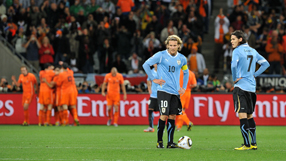Uruguay face struggle to stay at peak
CAPE TOWN - Uruguay's performance in reaching the last four at the World Cup has been an extraordinary struggle against the odds and keeping the tiny country among football's elite could prove even more difficult.

In fact, it is quite possible that Uruguay, beaten 3-2 by Netherlands in Tuesday's semi-final, might not even qualify for the next World Cup in neighbouring Brazil in 2014 given the difficulties they face.
Some pundits have sneered at Uruguay, pointing out that they beat Ghana in the quarter-finals after Luis Suarez stopped a goalbound shot with his hand on the line, but there has been much to admire as they hugely exceeded expectations.
Although Uruguay won the World Cup twice back in the early days of the tournament in 1930 and 1950, the country today can barely support a professional league.
Few first division matches attract more than a couple of thousand fans and many of the stadiums would not be considered fit for even semi-professional football in many European countries.
Penarol and Nacional, who once dominated the South American Libertadores Cup, are no longer feared on the continent and Uruguayan clubs won the last of their eight titles back in 1988.
The only way out for most young Uruguayan players is the airport. The lucky few end up in Europe but the country also exports dozens to Mexico, Argentina, Chile, Peru and Colombia.
Coach Oscar Tabarez, who also led the Celeste to the second round at the 1990 World Cup, sees his players only a few times a year and has warned frequently that the differences between countries such as Uruguay and rich European nations are growing.
Get FourFourTwo Newsletter
The best features, fun and footballing quizzes, straight to your inbox every week.
He says that European countries are snapping up Uruguayan players at an ever-younger age, sometimes in their mid-teens, and although the country produces players at an impressive rate, it does not have the chance to develop them.
YELLOW CARDS
Before Tuesday's game, a philosophical Tabarez said it would be impossible for Uruguay to stay among the elite, even if they won the World Cup.
"It would be utopian to think of Uruguay's permanence at the summit ... but we can believe in circumstantial results," he said.
Uruguay played a major role in turning soccer into an international sport, winning the 1924 and 1928 Olympic tournaments with a short-passing game which had never been seen before in Europe.
They were also at the forefront as the World Cup became a reality, hosting and winning the first tournament in 1930 at the Centenario stadium which is still used for their home games.
After winning again in 1950, other larger nations equalled their technical ability and, with such a small population, they fell behind.
At one stage, they became synonymous with rough play and gamesmanship, something which Tabarez and his immediate predecessors have worked hard to wipe out.
They completed two games in South Africa without receiving a single yellow card.
"We have worked with respect, humility and a belief in long-term projects and we have seen the reflection in the result," forward Sebastian Abreu told reporters after Tuesday's game. "It has been very positive for our country.
